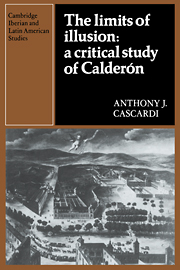Book contents
- Frontmatter
- Contents
- Preface
- Acknowledgments
- Note on texts and notes
- Introduction
- 1 La vida es sueño: Calderón's idea of a theatre
- 2 La dama duende
- 3 Calderón and Tirso: El galán fantasma
- 4 El secreto a voces: language and social illusion
- 5 Toward tragedy
- 6 El médico de su honra
- 7 Herod and Hercules: theatrical space and the body
- 8 El mágico prodigioso and the theatre of alchemy
- 9 The illusions of history
- 10 Authority and illusion: En la vida todo es verdad y todo mentira
- 11 The use of myth: Eco y Narciso
- 12 Prometheus and the theatre of the mind
- 13 Calderón's last play: the comedia as technology and romance
- Notes
- Index
12 - Prometheus and the theatre of the mind
Published online by Cambridge University Press: 01 March 2010
- Frontmatter
- Contents
- Preface
- Acknowledgments
- Note on texts and notes
- Introduction
- 1 La vida es sueño: Calderón's idea of a theatre
- 2 La dama duende
- 3 Calderón and Tirso: El galán fantasma
- 4 El secreto a voces: language and social illusion
- 5 Toward tragedy
- 6 El médico de su honra
- 7 Herod and Hercules: theatrical space and the body
- 8 El mágico prodigioso and the theatre of alchemy
- 9 The illusions of history
- 10 Authority and illusion: En la vida todo es verdad y todo mentira
- 11 The use of myth: Eco y Narciso
- 12 Prometheus and the theatre of the mind
- 13 Calderón's last play: the comedia as technology and romance
- Notes
- Index
Summary
Is it any easier to resist the seductions of the mind than those of the senses? Or does the intellect itself not threaten to enclose us in the illusory world of its order with even more guile than that with which nature solicits our confidence? Are not the sins of the mind in fact graver than those of the flesh? Aquinas thought so (see the Summa, IaIIae, 73, 5). What happens, then, after Calderón finds a final, ironic way of escape in a play like Eco y Narciso, disengaging himself and us from the beautiful object of his own fashioning, giving us over, instead, to an unbroken, closed surface for intellectual contemplation? Thematically, La estatua de Prometeo is the complement to Eco y Narciso, and in some ways the problem it poses is far more deeply rooted in Calderón's total oeuvre. If the mind is powerful enough to subvert physical nature, how may it overcome its own overweening tendencies? And how are the attractions of beauty not to sway us from moral goods? In the Scholastic tradition, in the Summa and in the commentaries on the De divinis nominibus, beauty is defined in terms of radiant form and intellectual brilliance, as consisting of “a certain clarity and due proportion,” each “firmly rooted in the reason [whose function it is] to shine the light in which beauty is seen and to set things in proportion” (Summa, IIaIIae, 180, 2). Formally and stylistically, Calderón displays a will to order and clarity of expression derived from this Scholastic tradition. Dante shared this sensibility.
- Type
- Chapter
- Information
- The Limits of Illusion: A Critical Study of Calderón , pp. 142 - 151Publisher: Cambridge University PressPrint publication year: 1984

